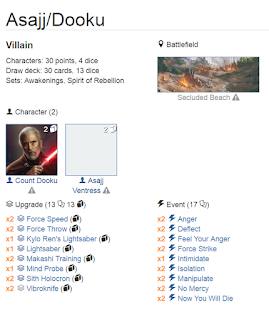Making reads on your opponent: An Introduction
Generally, in Destiny, we want to play efficiently to get
the most out of our rounds and quickly claim the battlefield. Due to this, it's generally best to:
1. activate all characters before ditching cards to reroll or
resolve dice, to help action efficiency and
get the most out of every action.
2. Match up die faces of the symbol and resolve all dice of
one symbol in one action, whenever possible, for action efficiency.
3. Know when to cut
your losses when your opponent is close to claiming if you need to claim faster.
Things like not taking resources when you don't need them, and choosing
not to resolve other dice such as disrupt, discard, and sometimes resolving
shields when they aren't needed.
By following these three rules, you will generally stay one
step ahead of an opponent who isn't following these rules, just due to how much
more efficient it is to play like this.
However, there are times that playing efficiently isn't
always the correct play given a particular situation. Sometimes, it may be best to resolve some
damage early before activating all characters, or delay an activation to
resolve some other dice in the pool, or to even pass actions and do nothing at
all! These will all vary per situation,
and a few reasons to make plays that may seem suboptimal and inefficient
include the following:
1. Resolving damage before removal or manipulation. Sometimes, it's important to resolve some damage
before it can get manipulated. Commonly
played dice removal cards can remove some key damage dice and prevent
resolution of some modifiers. This can
cause large tempo swings, especially when you need to eliminate dangerous
characters as soon as possible.
Resolving damage ASAP in increments as you activate characters can help
mitigate any risk of losing a lot of potential damage to cards like block or
dodge
2. Forcing a play from the opponent. Sometimes, a player will simply pass the turn
to force their opponent to take the initiative.
Oftentimes, this is generally done by a player who has performed all
useful actions on their turn, but is wary of the result of a reroll on their
opponent's end that they need to be able to interact with. Since claiming the battlefield means that a
player surrenders all ability to interact with dice, it leaves that player
vulnerable to rerolls and getting blown out by a good reroll from their
opponent. You want to limit the times
that you become vulnerable to your opponent, and oftentimes, this is worth
sacrificing your ability to claim.
Forcing a play from the opponent is a common tactic that some players
use to get around Jango Fett's very powerful activation ability.
3. Characters with low health. It's normal to expect that some characters will
be defeated on both sides during a game of Destiny. Should you lose a character, you generally
want to get as much value out of a character as possible, which includes
replacing as non-redeploy upgrades as possible, activating and resolving that
character's dice as quickly as possible, or delaying a different character
activation and waiting for a character death in order to receive a redeploy
upgrade to roll out.
4. Situational cards.
Sometimes, players may want to hold on to the results of some dice in
order to use it for a card that may require a specific dice face to be
present. A common example is holding on
to a dice to set up a powerful force misdirection, but other examples may
include holding on to some damage dice to resolve a no mercy or a disarm.
While these reasons are not all-inclusive reasons for a
player to make plays that you may find strange, examining certain situations
and strange plays more closely can help you make reads on your opponent,
allowing you to adjust accordingly.


Comments
Post a Comment